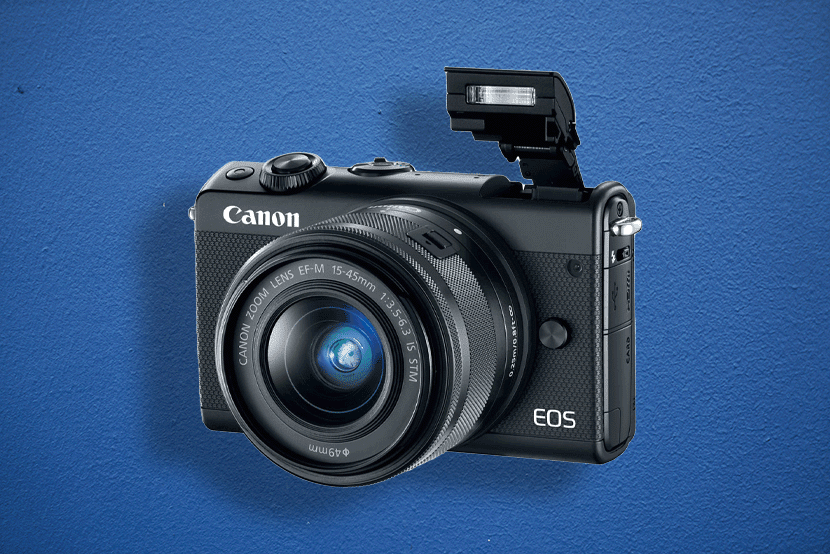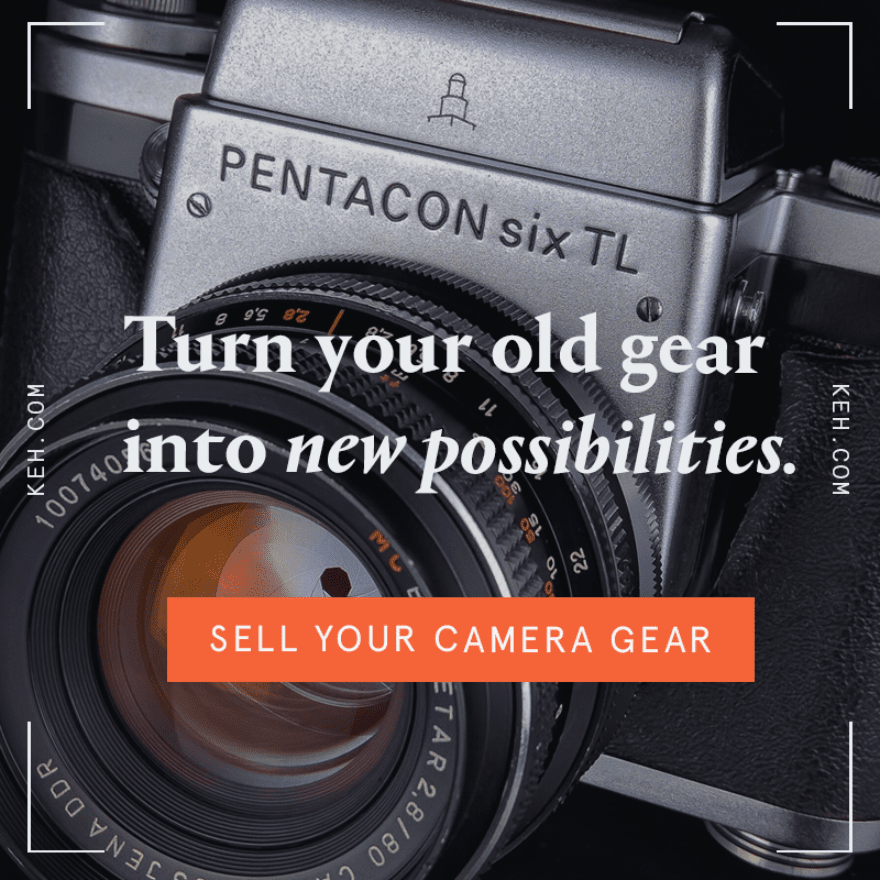Mirrorless cameras are more popular than ever, and it can be hard to pick the best lenses for Canon EOS M100 cameras. That’s where our list of the 6 best lenses for Canon M100 comes in!
We picked the Canon EF-M 18-150mm as the best lens for the Canon m100 since it covers the most in-demand focal lengths and has great specs. However, you can find five other lenses worth checking out in our roundup.
Introducing the Top 6 Lenses for the Canon EOS M100 Mirrorless Camera!
- Canon EF-M 18-150mm f/3.5-6.3 IS STM Lens (Best All-Around Lens For Everyday Photography)
- TTArtisan 50mm f/2 Lens for Canon EF-M (Best 50mm Lens for Canon M100)
- Canon EF-M 55-200mm f/4.5-6.3 IS STM Lens (Best Zoom Lens for Canon EOS M100)
- Canon EF-M 28mm f/3.5 Macro IS STM Lens (Best Canon EOS M100 Macro Lens)
- Sigma 30mm f/1.4 DC DN Contemporary Lens (Best Video Lens for Canon M100)
- Canon EF-M 22mm f/2 STM Lens (Best Wide Angle Lens for Canon M100)
Let’s start things off with our number one lens for the EOS M100!
1. Canon EF-M 18-150mm f/3.5-6.3 IS STM Lens: Best All-Around Lens For Everyday Photography
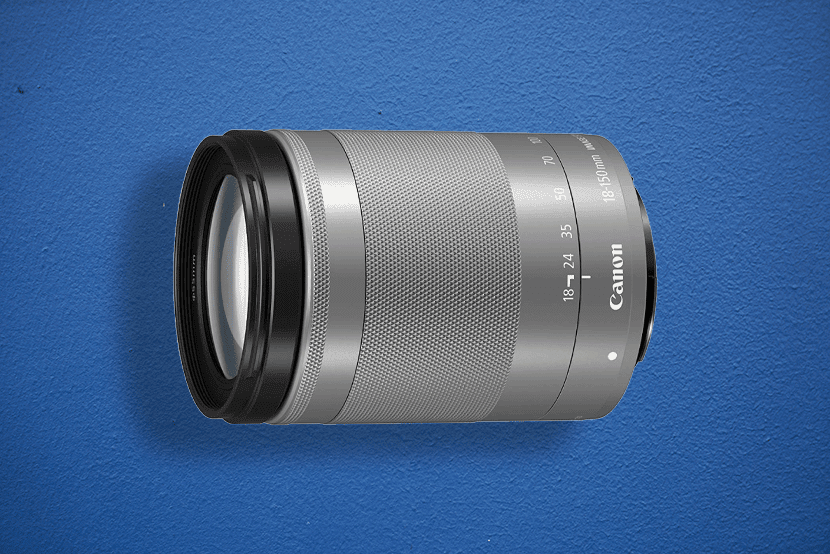
The best all-around lens for everyday photography has to be the Canon EF-M 18-150mm. This lens really does have it all when it comes to features, but we’re going to have to take a closer look to see what makes it so great.
The first thing that we have to point out is that this lens is operating with a crop sensor in mind. The focal length of 18 to 150 mm transforms into roughly 28 to 240 mm on a crop sensor camera.
This means that you still keep the wide-angle power, but you also get a better telephoto range. This focal length is really designed to be a jack-of-all-trades on a camera with a crop sensor.
This lens also has a really strong set of features when it comes to autofocus and image stabilization. The STM autofocus is a standard when it comes to Canon lenses and having both image stabilization and panning stabilization means your shots are going to be smoother than ever before.
You’re going to really improve your zoom with this lens. An 8.3x zoom is going to be great when it comes to covering pretty much anything from landscape photography to taking casual pictures of a sports game.
We also have to talk about the negatives when it comes to this lens.
Some of these features feel a little bit dated. Competition in the lens industry is only getting stronger and even cans of your lenses are showing a lot of advancement. It’s a little odd that these lenses feel a bit left behind.
Canon’s other lenses are starting to feature additional, customizable buttons as well as improvements when it comes to autofocus and the technology that they use in their motors. This is a budget lens meant for entry-level cameras, but it would be nice to see a few of those high-end features.
This is a smaller problem, but the amateur could be a bit lower. This only means that this lens is going to have a little bit more difficulty when handling low-light situations.
Pros
- 28.8-240mm equivalent focal length
- Minimum aperture of f/3.5
- STM autofocus
- IS and panning stabilization
- 8.3x zoom
Cons
- Some features feel a bit dated
- Aperture could be lower
2. TTArtisan 50mm f/2 Lens for Canon EF-M: 50mm Lens for Canon M100
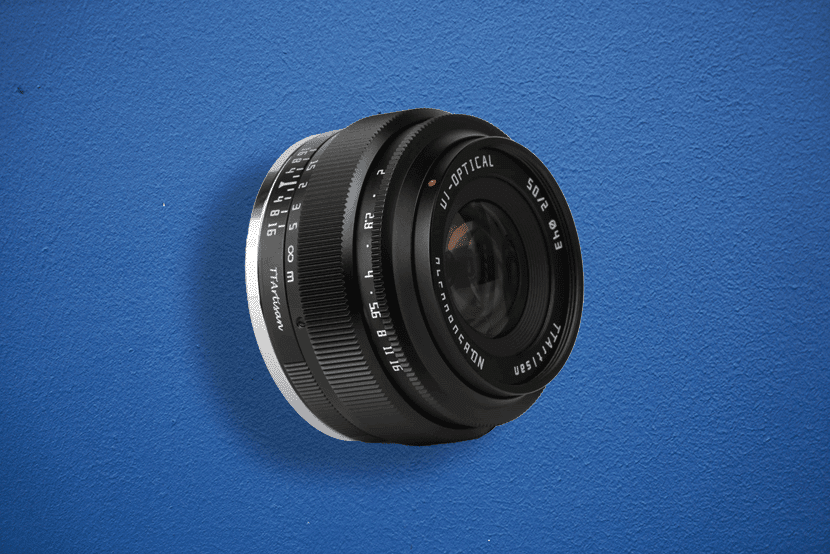
When it comes to finding a 50mm lens for Canon m100 cameras, you’re going to be in for a challenge. Canon does not currently make in-house 50 mm lenses for this camera, so we’re going to have to think outside the box.
The TTArtisan 50mm f/2 lens for Canon EF-M is the best choice for shooting 50mm prime on a Canon EOS M100 camera.
We’re going to start with the positives of this lens. The first thing that you’re going to notice is the ultra-compact design. This means it’s highly portable and can easily be stashed in a bag or even left on as a body cap for your Canon M100 camera.
It’s also got a sharp f/2 aperture. This is outstanding for people who are hoping to do low-light photography or capture portraits.
Speaking of portraits, this is a great lens for taking portrait pictures. It has got a bladed diaphragm which combines with that bright to aperture to get great bokeh for your shots.
This also leads us into some of the problems with this lens. Because we’re putting it on a crop sensor camera that means that the 50 mm focal length is actually going to be around 80 mm.
This is going to be a downside for anyone who’s hoping to enjoy the fact that a 50 mm lens has an average focal length. 50 mm wide enough for most situations, but also tight enough for most situations.
80 mm is more specialized for portraits. That means it’s actually a benefit if you’re hoping to get a lot of portraits out of this lens.
The next drawbacks with this lens are a little bit more complicated to talk about.
This lens is made by a third-party manufacturer which means it’s not going to have access to a lot of Canon’s software or technology. This means that you won’t be able to enjoy any manual focusing or other high-tech features with this lens.
This is definitely a downside for anyone looking to enjoy the high-tech mirrorless experience, but it can also be a benefit for people who are looking to go old-school with their photography and return to full manual control.
Pros
- Ultra-compact design
- Sharp f/2 aperture
- 10-blade diaphragm
- Great for portraits
Cons
- Manual focus
- No high-tech features
- 80mm equivalent
3. Canon EF-M 55-200mm f/4.5-6.3 IS STM Lens: Best Zoom Lens for Canon EOS m100
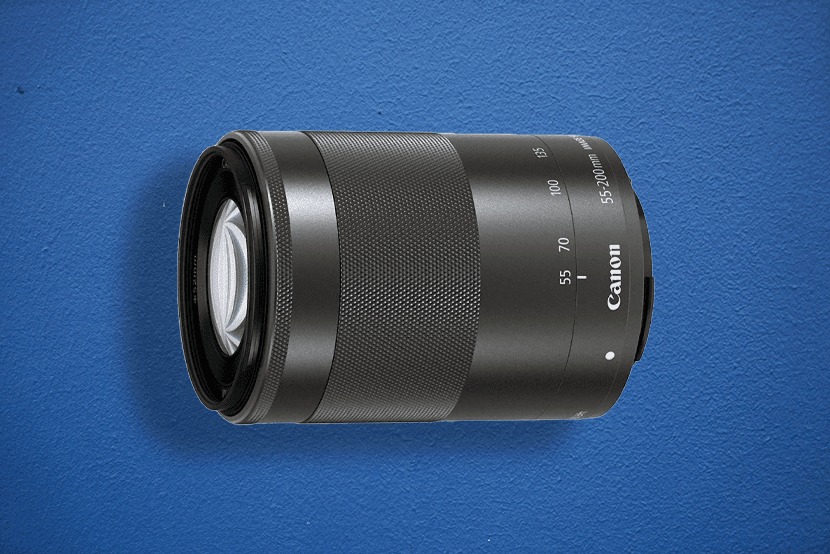
The best zoom lens for Canon eos m100 has to be the Canon EF-M 55-200mm. It’s got everything you need in a crop sensor zoom. Because of how far that crop pushes the total zoom of this lens, it’s also our pick for the best telephoto Lens For Canon eos m100.
There really is a lot to love when it comes to this lens. The aperture is very flexible and stays surprisingly bright given that this is a budget-friendly lens that’s also designed for a lot of telephoto work.
You typically see these lenses sacrificing a lot when it comes to their aperture, but this one stays nice and bright given what it is even when you’re working with the top end of the focal length.
This lens also has a 7 bladed diaphragm. This means that you’ll be able to dial in the focal length to about 80 mm and enjoy some portraiture. This doesn’t have to be about your classic telephotography styles like sports photography in nature photography. You can even do some portraits with this lens.
This lens also has a manual focus overdrive. This means you can switch to manual focusing with the press of a button.
This is great for photographers looking to hone their craft. If you’re looking to put your skills to the next level, this lens has the tools you need to switch in and out of autofocus and really take control of how your pictures turn out.
There aren’t really that many cons when it comes to this lens. The biggest downside that you’re going to have to deal with is the fact that the crop sensor magnifies the total focal length of the lens.
This is a huge downside when it comes to the wider angle side of things. That 55 mm transforms into an 88 mm which means it’s no longer so good for street photography or anything that requires a wider angle.
However, this is really more of a trade-off than it is a con. Because this also means it pushes the 200 mm top end to 320 mm. This means you go from an already-impressive telephoto zoom to an ultra-telephoto zoom.
If you’re not planning on doing any wide-angle photography, but you really want to get the most out of a zoom lens, this is definitely the lens you want to pick.
Pros
- Flexible aperture
- 7-bladed diaphragm
- Manual focus override
- Optical elements for greater clarity
Cons
- 88-320mm equivalent zoom
4. Canon EF-M 28mm f/3.5 Macro IS STM Lens: Canon EOS m100 Macro Lens
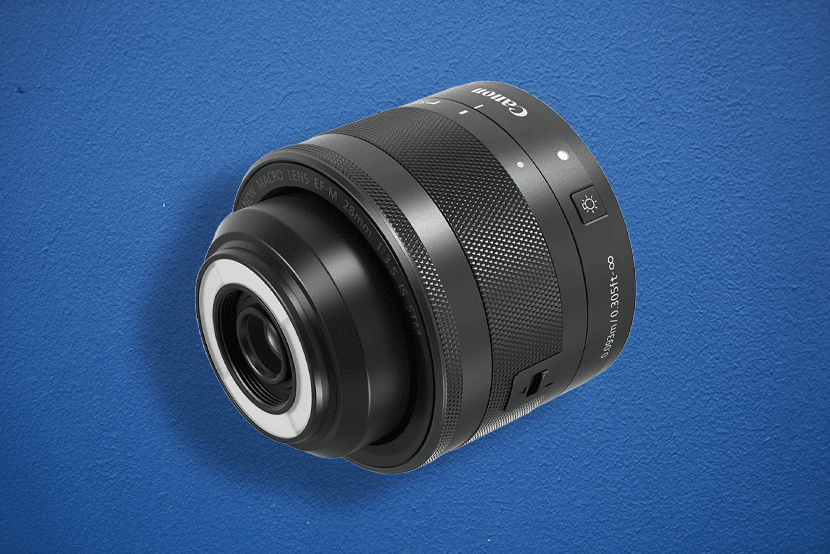
The best Canon eos m100 macro lens is the Canon EF-M 28mm f/3.5 Macro IS STM lens. It’s got all of the features you need to get into macro photography without any of the usual downsides. Let’s take a look!
If you’re doing your photography on the Canon M100, you are probably intermediate in your skills or on a budget, that means it’s going to be the perfect macro lens for you. This is a great macro lens for learning the craft as well as being flexible when it comes to protecting your skills.
The built-in LED light is super useful for fruit beginners. Lighting macro shots is one of the most difficult things you have to learn and including LED light makes the process so much more simple when you’re just getting started.
This lens also has 1.2x magnification which means that you can take pictures just slightly larger than life-size. Since 1:1 is the golden standard, this lens is already doing better than most.
Then there are the negative points of this lens.
Again, we have to highlight that this is a crop sensor lens which means that it’s going to change the focal length. 30 mm is very friendly for macro photography, but this is actually a 44.8 MM equivalent lens. This means your macro photography is going to be a little bit more difficult to balance as 44.8 mm is a bit awkward for a focal length.
This lens also comes packed with bonus features that you might not ever actually use.
The built-in LED light is incredibly useful when you need it, but once you learn more about setting up your own lighting it all of a sudden becomes less than useful. You might find yourself accidentally pressing the built-in LED light button and messing up your shot more often than not.
This lens is also a retractable which means it’s very compact and portable, but it’s already a prime lens which means it was compact and portable to begin with. We’re not exactly sure how much value is added with the retractable feature when it comes to this prime macro lens.
Pros
- Bright f//3.5 aperture
- Super macro setting for 3.7 inch focal distance
- 1.2x magnification
- Built-in LED
- Image stabilization
Cons
- 44.8mm equivalent
- Bonus features not always useful
5. Sigma 30mm f/1.4 DC DN Contemporary Lens: Video Lens for Canon m100
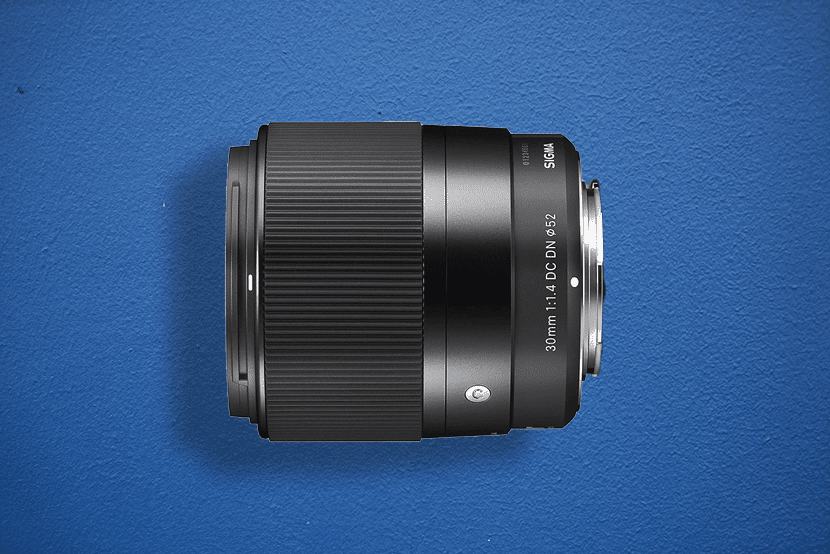
The best video lens for Canon m100 goes to the Sigma 30mm f/1.4 DC DN Contemporary lens. This lens really has everything you need to get started with video on the Canon EOS M100.
This lens is overwhelmingly positive when it comes to looking at videography on the Canon EOS 100m.
This lens is built with an optical element as well as a multi-layer coating that help to reduce visual distortions while filming. It also has a 9 bladed diaphragm in an incredibly bright aperture.
It’s worth highlighting that aperture. You usually don’t see an aperture that bright until you start looking at much more expensive professional lenses.
This lens is going to be an absolute all-star if you’re looking to jump into videography.
Now for the downsides of this lens one of them you’re going to expect and the other might be a surprise.
This is actually a 48 mm equivalent lens when using a crop sensor camera. One of the biggest benefits of shooting at 30 mm on a full size lens is that it’s flexible enough to handle wide angles comfortably while still being able to get nice and tight for portrait or head and shoulders shots
48 mm is going to struggle when it comes to handling those really tight shooting locations. If you’re looking to use this in a cramped bedroom to start your YouTube career, you might want to consider a wider angle for more flexibility.
This is also a lens from a competing brand. This is a Sigma lens which means that there might be some unexpected hiccups along the way. Sigma is the biggest name when it comes to third-party lenses, but there are occasionally some trade-offs when connecting a Sigma lens to a Canon camera.
Even with those downsides factored in, this is still one of the best picks for shooting on a Canon EOS 100m.
Pros
- One High-Refractive Index Element
- Super Multi-Layer Coating
- 9-bladed diaphragm
- Super fast autofocus
Cons
- 48mm equivalent
- A non-Canon brand might bother some Canon purists
6. Canon EF-M 22mm f/2 STM Lens: Wide Angle Lens for Canon m100
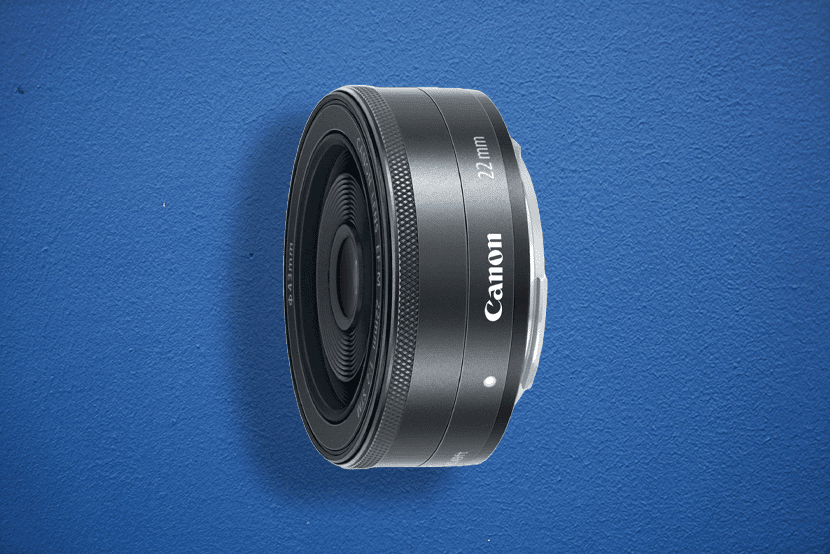
The best wide-angle lens for Canon m100 cameras is the Canon EF-M 22mm f/2 STM lens.
Canon makes a specific type of lens, and they’re the best at it. These are what we call Pancake lenses. They get that name because they’re the most compact lenses that you can buy.
There are a lot of professional photographers out there who will use this lens as, essentially, a body cap for their camera. This means that they can take pictures on the fly without having to worry about connecting a lens when their cameras are safely stored away in the bag.
Not only are these lenses ultralight and easy to carry, they also produce some amazing results.
The bright aperture and a minimum focusing distance that is only 5.9 inches mean that you can do pretty much anything with this camera. It’s going to do a great job with landscape and interior photography, but it’s also going to handle street photography just as nicely.
You can even get creative and use this lens to jump into wedding or event photography given how bright the aperture is.
However, there are a few things about this lens that could be improved on or are inherent flaws in its design that might not make it right for you.
One of the things we need to look at is that 22 mm focal distances aren’t really the best for portraits. Different focal lengths tend to distort the human face in ways that are not that pleasant when it comes to taking portraits. 22 mm is one of those negative focal lengths for portraiture.
You could always fix this and post-production, but that means having to learn how to use a piece of software like Photoshop or Lightroom.
This lens is also designed for a super simplistic experience. You’re not going to find the high-tech features that we’ve come to expect on mirrorless lenses with this particular lens.
Although, that could actually be a benefit if you’re looking for something compact, affordable, and light wait that’s not going to bug you down with a bunch of extra buttons to click.
Pros
- Ultra-compact design
- Bright aperture
- Stepping motor
- Minimum focus distance of only 5.9 inches
Cons
- Not the best for portraits
- Not high-tech features
How to Buy The Best Lenses for Canon EOS M100 Cameras
Now that you know the best lenses for Canon EOS M100 cameras, what other questions could you have?
We’ve got answers to some of the most asked questions about the EOS M100 camera and all the lenses that it uses!
How old is the Canon EOS M100
The Canon EOS M100 camera was first announced by Canon in August of 2017. Since then, it has been replaced by the EOS M200 which uses the same EF-M Mount. This means you can use the best lenses for Canon M100 cameras with the new model as well!
What lens mount is Canon M100
Canon has been changing things up and this means you need to know more about Canon m100 compatible lenses. These lenses all use the new EF-M mount that Canon is using for its mirrorless cameras. If you want to use other lenses with your Canon EOS M100 camera, you’ll need to get a lens adapter that converts other mounting systems to the EF-M mount.
What is the difference between EF and EF-M lenses?
EF-M lenses for Canon M100 cameras are Canon’s new line of lenses designed to be compatible with Canon’s new mirrorless cameras. EF has been Canon’s name for their lenses for a long time, and it stands for “Electronic Focus.”
The easiest way to think about this is as EF-M as a subcategory of EF lenses.
Can you use EF lenses on M100?
All of our picks for the best lens for Canon m100 cameras are technically “EF” lenses. You need to make sure that your lenses are EF-M otherwise they will not work with Canon’s M100 or M200 cameras.
You can use lens mount adapters to get lenses from other brands to work, but you might not get all of the features. Older lenses might not be compatible with autofocus and other brands might have proprietary buttons or switches that won’t work with a Canon camera.
Canon EOS m100 lens adapter
Lens adapters for Canon cameras are where things get really interesting. A lens adapter just connects one mounting system to another. This allows you to use lenses from other brands, or even other Canon mounting systems, with your new camera.
Mounting systems do not add any focal length distance to your lens. They simply change the mounting mechanism. Just keep in mind that not all features are going to work on your new Canon camera.
Conclusion – Which lens should I buy for my Canon EOS M100?
Now that you’re up to speed on the best lenses for Canon EOS M100, which one are you going with?
Our pick for the best lens for Canon m100 went to the Canon EF-M 18-150mm for its all-around performance and versatility. However, no list of the best lenses for Canon M100 cameras would be complete without the Canon EF-M 55-200mm telephoto lens or the Canon EF-M 22mm lens for wide angle shooting.
Need more than just a few lenses for Canon M100? Check out our other articles for the best lenses for any camera you’ve got!

